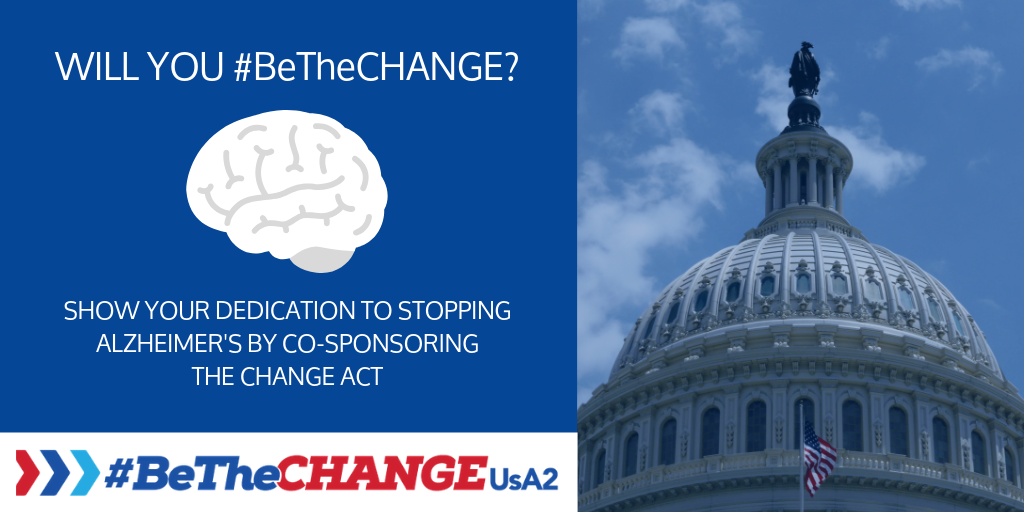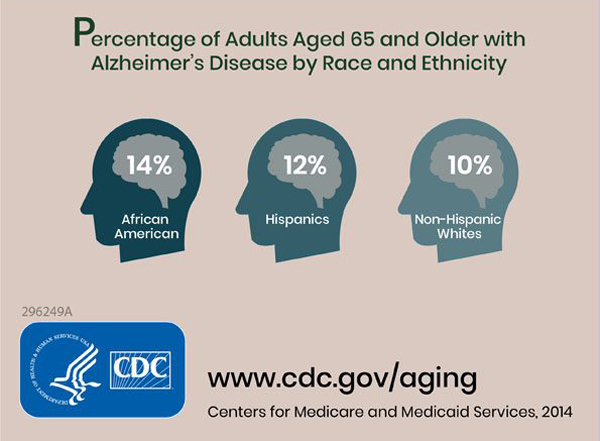
Share On Social!
The U.S. burden of Alzheimer’s disease and related dementia will more than double within 50 years, and Latinos will suffer the biggest rise, according to the CDC.
Alzheimer’s is the only top-10 cause of death without an effective treatment or cure.
However, new legislation is targeting this rising crisis.
The CHANGE Act
The CHANGE Act takes a targeted approach to addressing our nation’s Alzheimer’s crisis by encouraging early detection, diagnosis, and access to interventions, according to UsAgainstAlzheimer’s.
The CHANGE Act was introduced by eight U.S. Senators, including two Latinos, Robert Menendez (D-NJ) and Linda Sanchez (D-CA). Some of the senators are Republican, some Democrat.
The latest emerging science indicates that proactive, risk-modifying measures exist that can strengthen brain health and increase resiliency against cognitive decline.
 The Centers for Medicare and Medicaid Services (CMS) announced plans for 2020 that include financial incentives to screen for and identify individuals with dementias.
The Centers for Medicare and Medicaid Services (CMS) announced plans for 2020 that include financial incentives to screen for and identify individuals with dementias.
While CMS has recognized the importance of dementia detection, without policies in place to implement these tools, they will never realize their full potential, which makes the CHANGE Act so critical, writes George Vradenburg, co-founder and chairman of UsAgainstAlzheimer’s, in an op-ed in The Hill.
“CHANGE would incentivize and equip providers with the tools they need to accurately detect and diagnose Alzheimer’s at its earliest stages by directing CMS to require the use of cognitive impairment detection tools identified by the National Institutes of Health,” Vradenburg wrote in the op-ed.
Bill Provisions
According to UsAgainstAlzheimer’s, the bill would have two big impacts.
Detection and Treatment. The bill “directs the Centers for Medicare and Medicaid Services to require use of cognitive impairment detection tool or set of tools identified by the NIH (National Institutes of Health). Use of these tools will incentivize clinicians to detect and diagnose Alzheimer’s and related dementias in their earliest stages. If cognitive impairment is detected, patients are to be referred for additional testing, to community-based support services, and to appropriate clinical trials.”
Access to Care. The bill “requires the Centers of Medicare and Medicaid Services to lead, create, adopt, and recognize quality measures and incentives to promote the detection and diagnosis of Alzheimer’s disease or related dementias and appropriate care planning services, including potential for clinical trial participation.”
“I’m heartened that leaders in Congress are working together to solve what has become the greatest public health crisis of our time,” Vradenburg wrote in the op-ed.
Organizations can endorse the bill here.
The Current State of Latinos & Alzheimer’s
Every 65 seconds, someone develops Alzheimer’s disease.
 U.S. Latinos are 1.5 times more likely to develop Alzheimer’s than White non-Latinos. Latinas are at higher risk than non-Latinas.
U.S. Latinos are 1.5 times more likely to develop Alzheimer’s than White non-Latinos. Latinas are at higher risk than non-Latinas.
Latinos living with Alzheimer’s will rise from 430,000 in 2014 to 3.2 million in 2060. That is a more than seven-fold increase in that span.
Genetics and socioeconomic factors play a role. Also, lifestyle factors like alcohol consumption and lack of sleep impact the rate of Alzheimer’s among Latinos.
Economic Burden on Latinos Due to Alzheimer’s
Alzheimer’s is currently America’s biggest healthcare crisis—economically, socially, and medically.
There are more than 16.1 million American’s who provide unpaid care for people with Alzheimer’s. That is about 18.4 billion hours of care per year, valued over $232 billion.
By mid-century it may increase to $1.1 trillion.
 In 2019, Alzheimer’s and other dementias will cost the United States an estimated $290 billion. This includes $195 billion in Medicare and Medicaid payments.
In 2019, Alzheimer’s and other dementias will cost the United States an estimated $290 billion. This includes $195 billion in Medicare and Medicaid payments.
Family is the heart of the Latino culture. Children often must care for aging parents.
Latino caregivers spend 32 about hours a week giving care and taking on the more intensive caregiving needs. That’s more time than caregivers from other ethnic groups.
About 43% of Latino caregivers live with their loved ones versus 32% of non-Latino caregivers.
Many studies show that Latino caregivers of patients with chronic diseases like Alzheimer’s deal with high levels of stress, anxiety, and depression symptoms.
Learn More about Alzheimer’s and Latinos
Check out these stories how different factors affect Alzheimer’s among Latinos:
- Neighborhood Characteristics Affect Latino Caregivers’ Wellness, Stress
- How to Ease Stress for Latino Caregivers of Family with Alzheimer’s Disease
- The Controversial Role of Genetics in Alzheimer’s Disease in Latinos
- Study: Lack of Sleep May Boost Risk for Alzheimer’s Disease
- Could a Childhood Virus Play a Later Role in Alzheimer’s Disease?
Explore More:
Healthcare AccessBy The Numbers
142
Percent
Expected rise in Latino cancer cases in coming years



